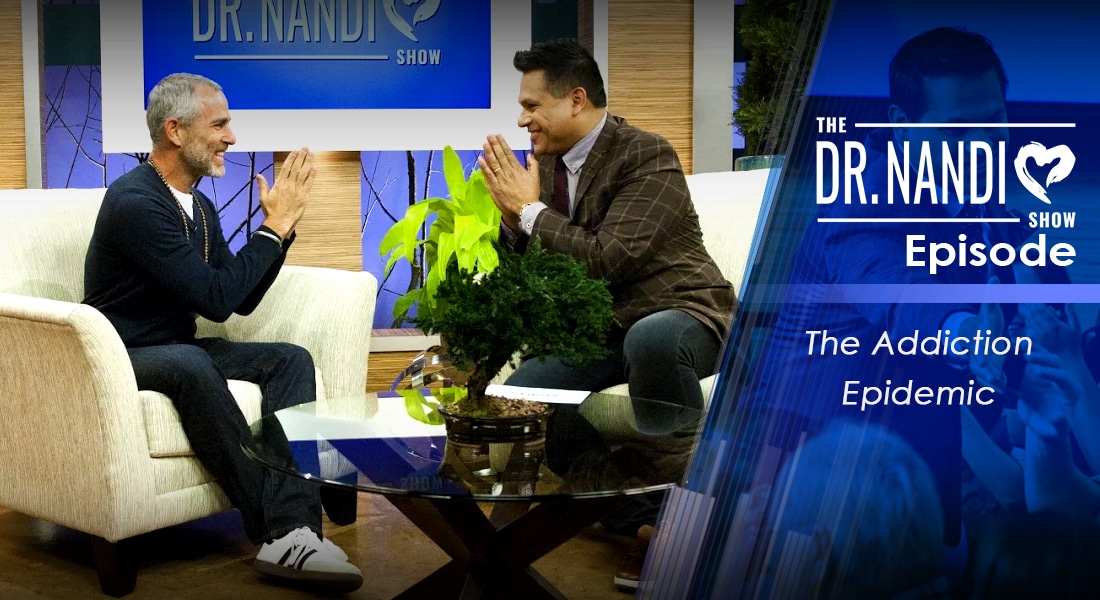
One in twelve of us, right here in America, has a drinking problem, and tragically, by the time today’s show ends, five of us – somebody’s son, a young mom perhaps – will bring their lives to an end by abusing opioids.
We’re in the middle of an addiction epidemic, but are we doing enough to fix families in its grip?
In this episode, we’ll hear from ex-addicts and some of the country’s most respected leaders in the areas of recovery and treatment. They’ve agreed to talk bluntly about the crisis and what it’s really gonna take for our nation to make a full recovery.
General overdoses now will kill more Americans in one year than the entire Vietnam War did! Even when addicts get treatment, there’s an astonishing 30 to 90% chance that they will relapse. Throughout this episode, you’ll meet amazing people who battle every day to stay sober, to stay clean, to stay alive. And my goal during these discussions is to focus on what should be done long-term to help those with the disease of addiction win their own very personal war.
My first guest, Tommy Rosen, had an acute drug and alcohol problem. He says addiction is really the disease of “looking away,” a failure to face up to pain or fear in your life. But 26 years ago he found the courage to look at his problems head-on. And ever since then has been in continuous recovery.
Tommy said that most people think about addiction as a particular substance. So I drink too much. I’m an alcoholic. I’m addicted to heroin. I’m a drug addict. Addiction is so much more than just that. It’s not about the substance. It’s not about the behavior, but rather about the causes and conditions underneath. So there’s a condition known as addiction. It is any behavior you do despite the fact that that behavior brings a negative consequence into your life. If you continue that behavior, that’s in the realm of addiction.
Drugs and alcohol can cause addiction, however, other things, such as food can as well. Addiction to food and sugar is a huge problem in our country. Tommy and I agree that nobody escapes from addiction, but it just depends on how acceptable that addiction is. We are all in a condition. We’re human beings, and we’re struggling in a variety of different ways. Everybody’s facing something, and our natural inclination is to try to solve problems. The main problem we have, generally, as human beings is we don’t feel well inside. We feel a sense of separation or loneliness or maybe we feel a sense of insecurity or abandonment. This can lead to addiction. Tommy and I really dug deep into this topic.
My next guest is Ashton Marr. She was a girl scout who sold cookies and was a straight-A student from a great home.
By all outward appearances, she was a happy and well-adjusted kid, and she had a great family. Her Mom and Dad are both, to this day, her number one supporters. And when she got to high school, it was like this whole new world opened up to her. All of a sudden, she was very unsure of her place in the world. She became very anxious, and she didn’t know that it was okay to “not be okay”. And that there was help. So when substances were presented to her, she started using and went down a very slippery slope. She was only 14 when this first started: first tobacco, then marijuana, then cocaine. Ashton and I talk more about her experience of addiction and recovery.
My third guest is Jeremy Barton. At 14, he was drinking after school. By 18, he was addicted to crack-cocaine. I have it he was so desperate to feed his addiction, he stole from his own grandmother. But he’s since turned his life around.
For him, like for many, it started out innocent. Smoking weed after the football game, drinking a couple beers. And then it progressed into cocaine, and then he was a senior in high school, and he was introduced to crack-cocaine. The minute that he used crack-cocaine, all bets were off. He was willing to do whatever it took to get high. He started stealing from family. We talk about his reasons behind his addiction, how he ended up in prison, and, most importantly, his recovery.
My fourth guest is Dr. Carl Christensen from Michigan’s Dawn Farm Treatment Center. He said there is a genetic link to addiction. Genetics are important, especially for males. Trauma is important also, and trauma can be emotional, physical, or sexual. It doesn’t have to be something as horrific as rape trauma, it can be a family split, for example. Or it can be a drug. A drug is so reinforcing that it can cause addiction all by itself, and the drugs we typically talk about are crack-cocaine, tobacco, and also food. When we consider genetics and addiction, it can be either an underlying genetic condition, or it can be something that has happened to you during your life. And actually, chronic pain itself can also, in some people, trigger an addiction. Dr. Christensen and I discuss the addict’s brain, genetics, and other reasons behind addiction.
No products in the cart.
*These statements have not been evaluated by the Food and Drug Administration. This product is not intended to diagnose, treat, cure, or prevent any disease.